Communication Skills: A Reflective Essay on Negotiation and Influence
VerifiedAdded on 2023/06/18
|9
|2434
|308
Essay
AI Summary
This reflective essay provides an account of the author's experiences and understanding of communication, negotiation, and influencing skills in the workplace. It highlights the significance of effective communication in preventing employee dissatisfaction, stress, and disengagement. The essay also explores methods to enhance negotiation and influencing skills to foster team member and consumer engagement, and positive action. It addresses various communication types, communicator styles, and barriers to effective communication, emphasizing the role of emotional intelligence. The essay further discusses distributive and integrative negotiation, personal influence, and skills required to influence others, concluding that effective communication, negotiation, and influencing skills are essential for success in both professional and personal life. Desklib provides access to this assignment and many other solved assignments for students.
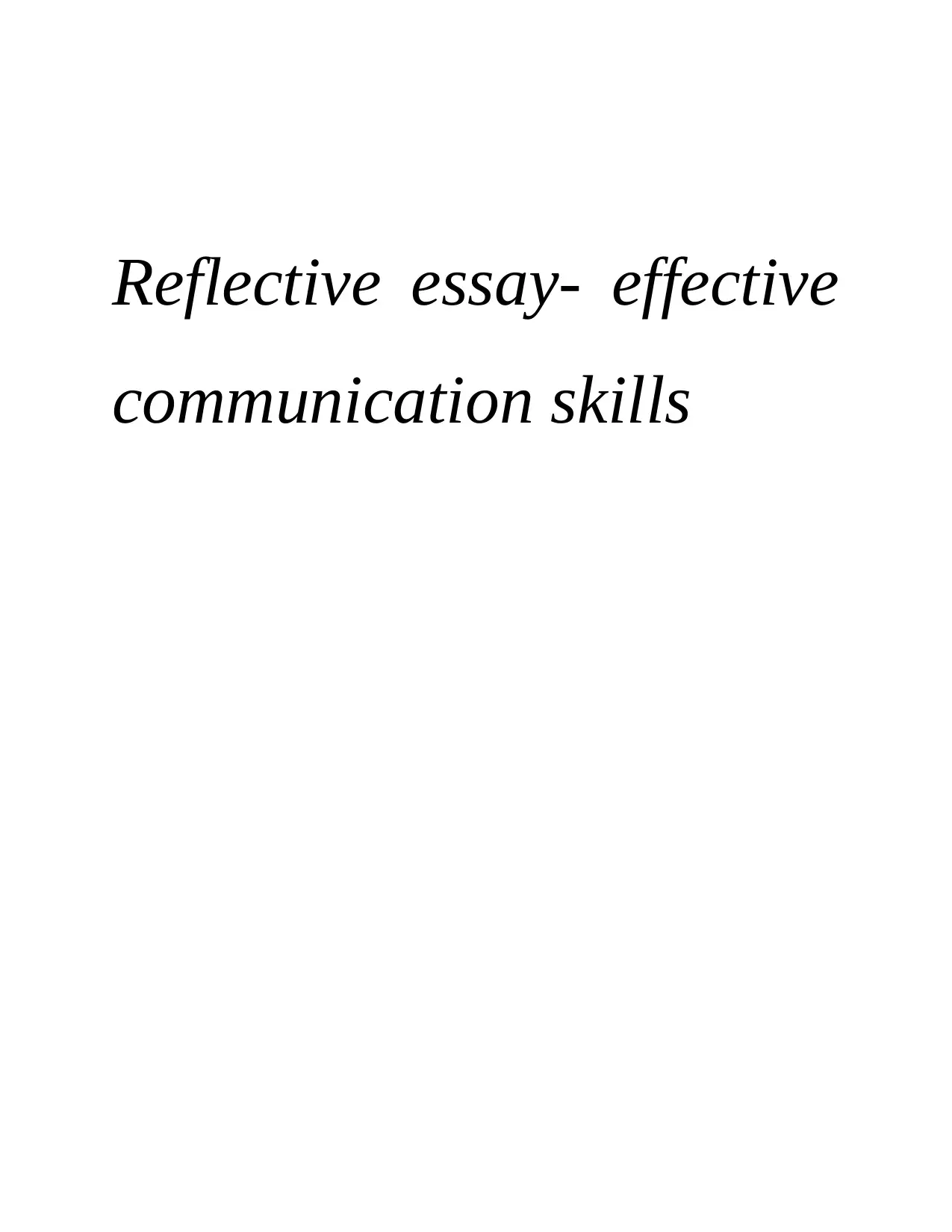
Reflective essay- effective
communication skills
communication skills
Paraphrase This Document
Need a fresh take? Get an instant paraphrase of this document with our AI Paraphraser
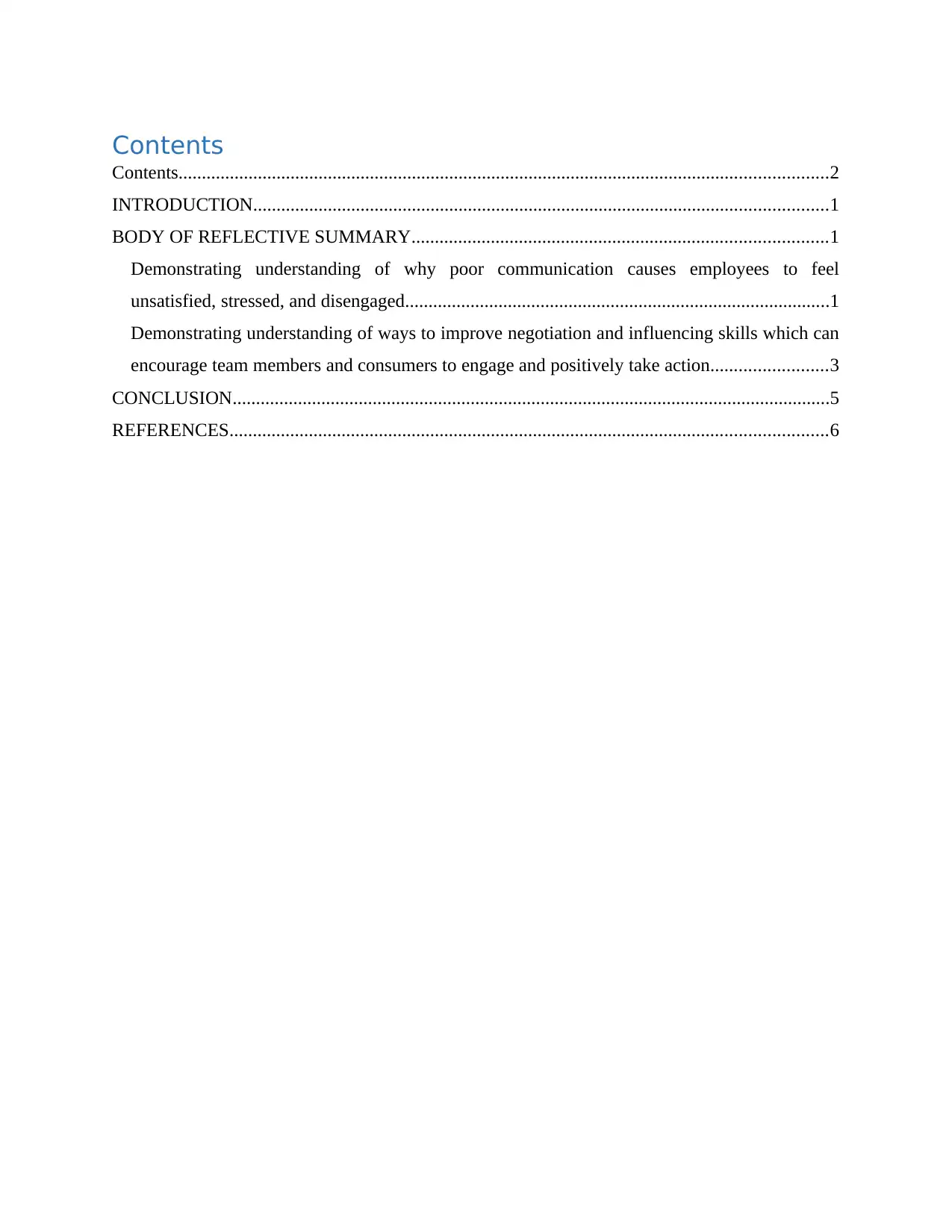
Contents
Contents...........................................................................................................................................2
INTRODUCTION...........................................................................................................................1
BODY OF REFLECTIVE SUMMARY.........................................................................................1
Demonstrating understanding of why poor communication causes employees to feel
unsatisfied, stressed, and disengaged...........................................................................................1
Demonstrating understanding of ways to improve negotiation and influencing skills which can
encourage team members and consumers to engage and positively take action.........................3
CONCLUSION................................................................................................................................5
REFERENCES................................................................................................................................6
Contents...........................................................................................................................................2
INTRODUCTION...........................................................................................................................1
BODY OF REFLECTIVE SUMMARY.........................................................................................1
Demonstrating understanding of why poor communication causes employees to feel
unsatisfied, stressed, and disengaged...........................................................................................1
Demonstrating understanding of ways to improve negotiation and influencing skills which can
encourage team members and consumers to engage and positively take action.........................3
CONCLUSION................................................................................................................................5
REFERENCES................................................................................................................................6

⊘ This is a preview!⊘
Do you want full access?
Subscribe today to unlock all pages.

Trusted by 1+ million students worldwide
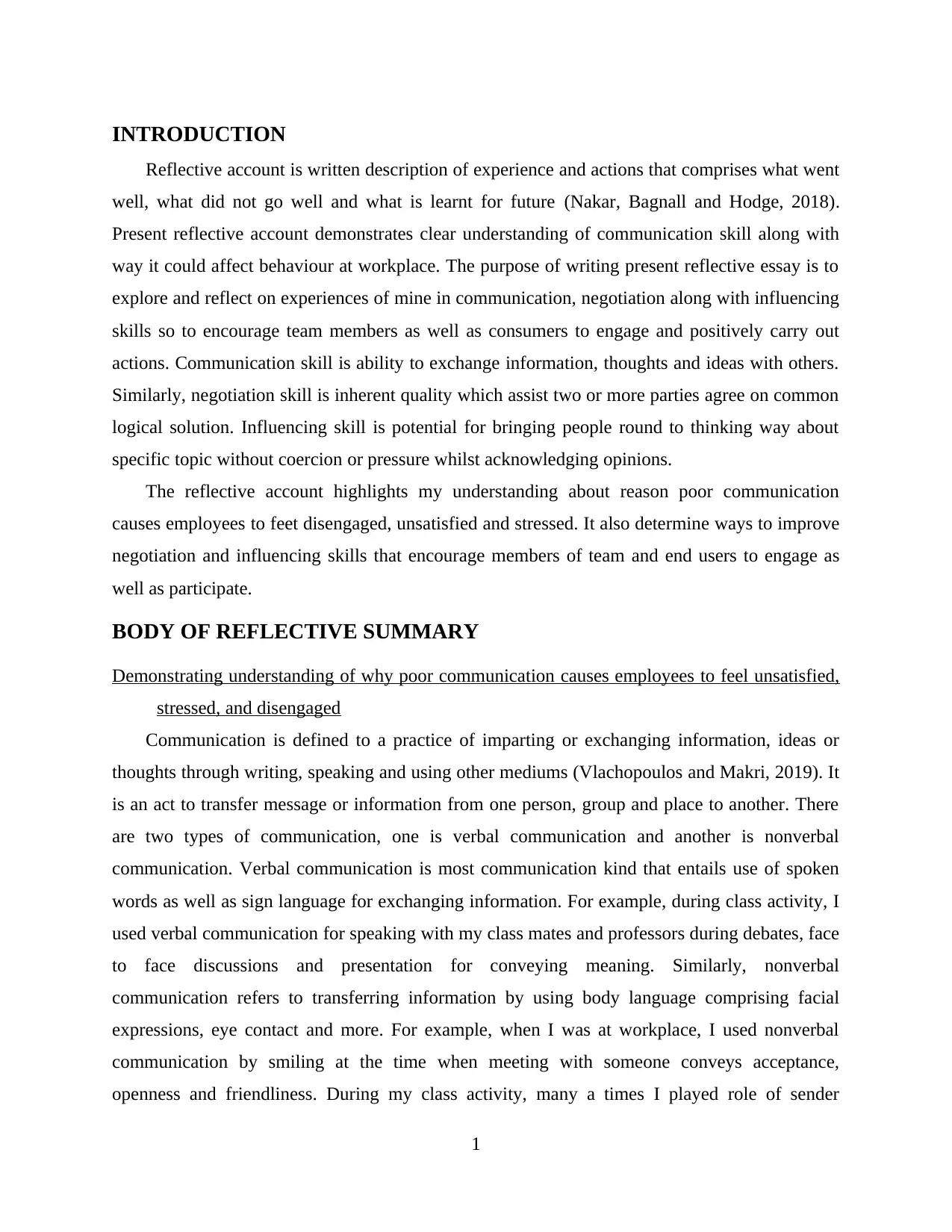
INTRODUCTION
Reflective account is written description of experience and actions that comprises what went
well, what did not go well and what is learnt for future (Nakar, Bagnall and Hodge, 2018).
Present reflective account demonstrates clear understanding of communication skill along with
way it could affect behaviour at workplace. The purpose of writing present reflective essay is to
explore and reflect on experiences of mine in communication, negotiation along with influencing
skills so to encourage team members as well as consumers to engage and positively carry out
actions. Communication skill is ability to exchange information, thoughts and ideas with others.
Similarly, negotiation skill is inherent quality which assist two or more parties agree on common
logical solution. Influencing skill is potential for bringing people round to thinking way about
specific topic without coercion or pressure whilst acknowledging opinions.
The reflective account highlights my understanding about reason poor communication
causes employees to feet disengaged, unsatisfied and stressed. It also determine ways to improve
negotiation and influencing skills that encourage members of team and end users to engage as
well as participate.
BODY OF REFLECTIVE SUMMARY
Demonstrating understanding of why poor communication causes employees to feel unsatisfied,
stressed, and disengaged
Communication is defined to a practice of imparting or exchanging information, ideas or
thoughts through writing, speaking and using other mediums (Vlachopoulos and Makri, 2019). It
is an act to transfer message or information from one person, group and place to another. There
are two types of communication, one is verbal communication and another is nonverbal
communication. Verbal communication is most communication kind that entails use of spoken
words as well as sign language for exchanging information. For example, during class activity, I
used verbal communication for speaking with my class mates and professors during debates, face
to face discussions and presentation for conveying meaning. Similarly, nonverbal
communication refers to transferring information by using body language comprising facial
expressions, eye contact and more. For example, when I was at workplace, I used nonverbal
communication by smiling at the time when meeting with someone conveys acceptance,
openness and friendliness. During my class activity, many a times I played role of sender
1
Reflective account is written description of experience and actions that comprises what went
well, what did not go well and what is learnt for future (Nakar, Bagnall and Hodge, 2018).
Present reflective account demonstrates clear understanding of communication skill along with
way it could affect behaviour at workplace. The purpose of writing present reflective essay is to
explore and reflect on experiences of mine in communication, negotiation along with influencing
skills so to encourage team members as well as consumers to engage and positively carry out
actions. Communication skill is ability to exchange information, thoughts and ideas with others.
Similarly, negotiation skill is inherent quality which assist two or more parties agree on common
logical solution. Influencing skill is potential for bringing people round to thinking way about
specific topic without coercion or pressure whilst acknowledging opinions.
The reflective account highlights my understanding about reason poor communication
causes employees to feet disengaged, unsatisfied and stressed. It also determine ways to improve
negotiation and influencing skills that encourage members of team and end users to engage as
well as participate.
BODY OF REFLECTIVE SUMMARY
Demonstrating understanding of why poor communication causes employees to feel unsatisfied,
stressed, and disengaged
Communication is defined to a practice of imparting or exchanging information, ideas or
thoughts through writing, speaking and using other mediums (Vlachopoulos and Makri, 2019). It
is an act to transfer message or information from one person, group and place to another. There
are two types of communication, one is verbal communication and another is nonverbal
communication. Verbal communication is most communication kind that entails use of spoken
words as well as sign language for exchanging information. For example, during class activity, I
used verbal communication for speaking with my class mates and professors during debates, face
to face discussions and presentation for conveying meaning. Similarly, nonverbal
communication refers to transferring information by using body language comprising facial
expressions, eye contact and more. For example, when I was at workplace, I used nonverbal
communication by smiling at the time when meeting with someone conveys acceptance,
openness and friendliness. During my class activity, many a times I played role of sender
1
Paraphrase This Document
Need a fresh take? Get an instant paraphrase of this document with our AI Paraphraser
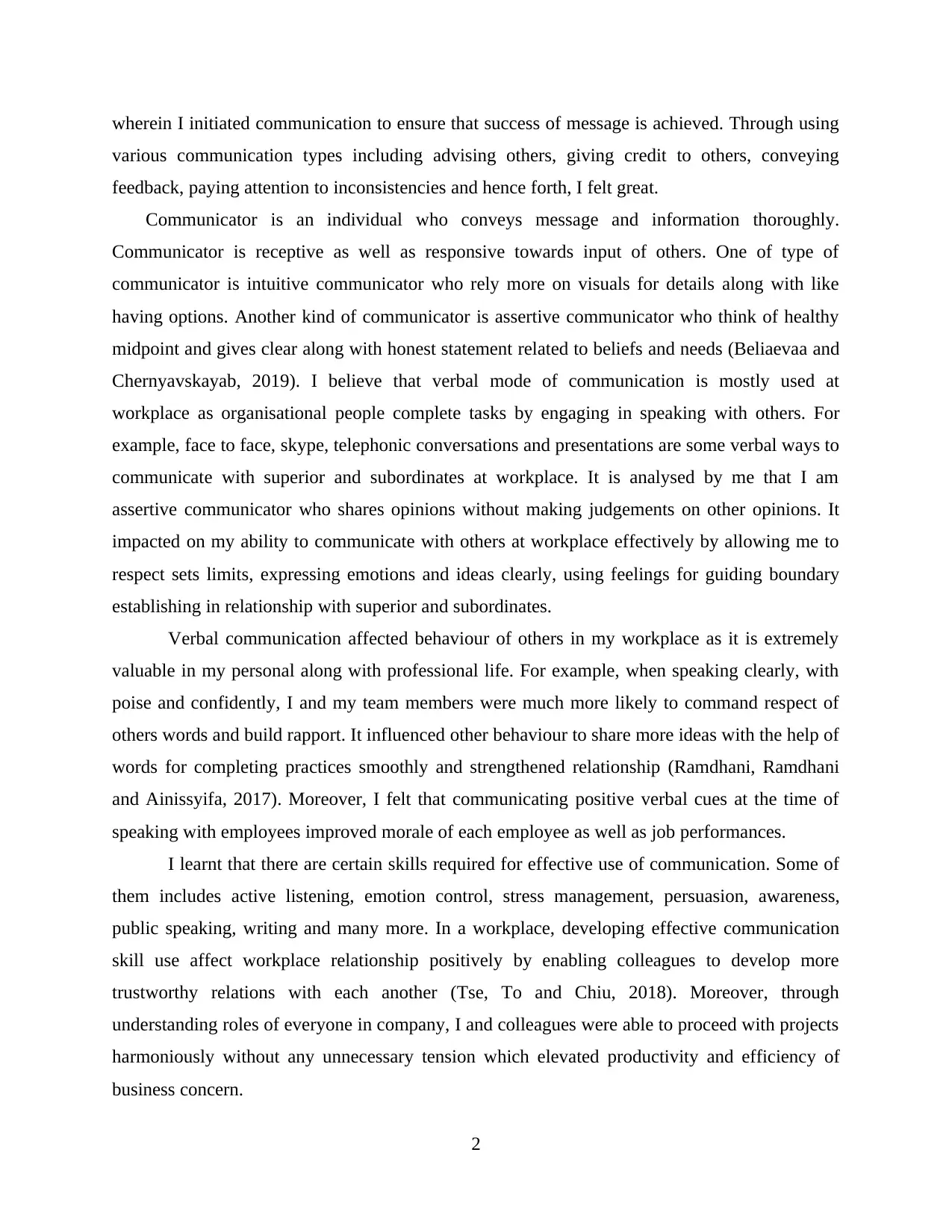
wherein I initiated communication to ensure that success of message is achieved. Through using
various communication types including advising others, giving credit to others, conveying
feedback, paying attention to inconsistencies and hence forth, I felt great.
Communicator is an individual who conveys message and information thoroughly.
Communicator is receptive as well as responsive towards input of others. One of type of
communicator is intuitive communicator who rely more on visuals for details along with like
having options. Another kind of communicator is assertive communicator who think of healthy
midpoint and gives clear along with honest statement related to beliefs and needs (Beliaevaa and
Chernyavskayab, 2019). I believe that verbal mode of communication is mostly used at
workplace as organisational people complete tasks by engaging in speaking with others. For
example, face to face, skype, telephonic conversations and presentations are some verbal ways to
communicate with superior and subordinates at workplace. It is analysed by me that I am
assertive communicator who shares opinions without making judgements on other opinions. It
impacted on my ability to communicate with others at workplace effectively by allowing me to
respect sets limits, expressing emotions and ideas clearly, using feelings for guiding boundary
establishing in relationship with superior and subordinates.
Verbal communication affected behaviour of others in my workplace as it is extremely
valuable in my personal along with professional life. For example, when speaking clearly, with
poise and confidently, I and my team members were much more likely to command respect of
others words and build rapport. It influenced other behaviour to share more ideas with the help of
words for completing practices smoothly and strengthened relationship (Ramdhani, Ramdhani
and Ainissyifa, 2017). Moreover, I felt that communicating positive verbal cues at the time of
speaking with employees improved morale of each employee as well as job performances.
I learnt that there are certain skills required for effective use of communication. Some of
them includes active listening, emotion control, stress management, persuasion, awareness,
public speaking, writing and many more. In a workplace, developing effective communication
skill use affect workplace relationship positively by enabling colleagues to develop more
trustworthy relations with each another (Tse, To and Chiu, 2018). Moreover, through
understanding roles of everyone in company, I and colleagues were able to proceed with projects
harmoniously without any unnecessary tension which elevated productivity and efficiency of
business concern.
2
various communication types including advising others, giving credit to others, conveying
feedback, paying attention to inconsistencies and hence forth, I felt great.
Communicator is an individual who conveys message and information thoroughly.
Communicator is receptive as well as responsive towards input of others. One of type of
communicator is intuitive communicator who rely more on visuals for details along with like
having options. Another kind of communicator is assertive communicator who think of healthy
midpoint and gives clear along with honest statement related to beliefs and needs (Beliaevaa and
Chernyavskayab, 2019). I believe that verbal mode of communication is mostly used at
workplace as organisational people complete tasks by engaging in speaking with others. For
example, face to face, skype, telephonic conversations and presentations are some verbal ways to
communicate with superior and subordinates at workplace. It is analysed by me that I am
assertive communicator who shares opinions without making judgements on other opinions. It
impacted on my ability to communicate with others at workplace effectively by allowing me to
respect sets limits, expressing emotions and ideas clearly, using feelings for guiding boundary
establishing in relationship with superior and subordinates.
Verbal communication affected behaviour of others in my workplace as it is extremely
valuable in my personal along with professional life. For example, when speaking clearly, with
poise and confidently, I and my team members were much more likely to command respect of
others words and build rapport. It influenced other behaviour to share more ideas with the help of
words for completing practices smoothly and strengthened relationship (Ramdhani, Ramdhani
and Ainissyifa, 2017). Moreover, I felt that communicating positive verbal cues at the time of
speaking with employees improved morale of each employee as well as job performances.
I learnt that there are certain skills required for effective use of communication. Some of
them includes active listening, emotion control, stress management, persuasion, awareness,
public speaking, writing and many more. In a workplace, developing effective communication
skill use affect workplace relationship positively by enabling colleagues to develop more
trustworthy relations with each another (Tse, To and Chiu, 2018). Moreover, through
understanding roles of everyone in company, I and colleagues were able to proceed with projects
harmoniously without any unnecessary tension which elevated productivity and efficiency of
business concern.
2
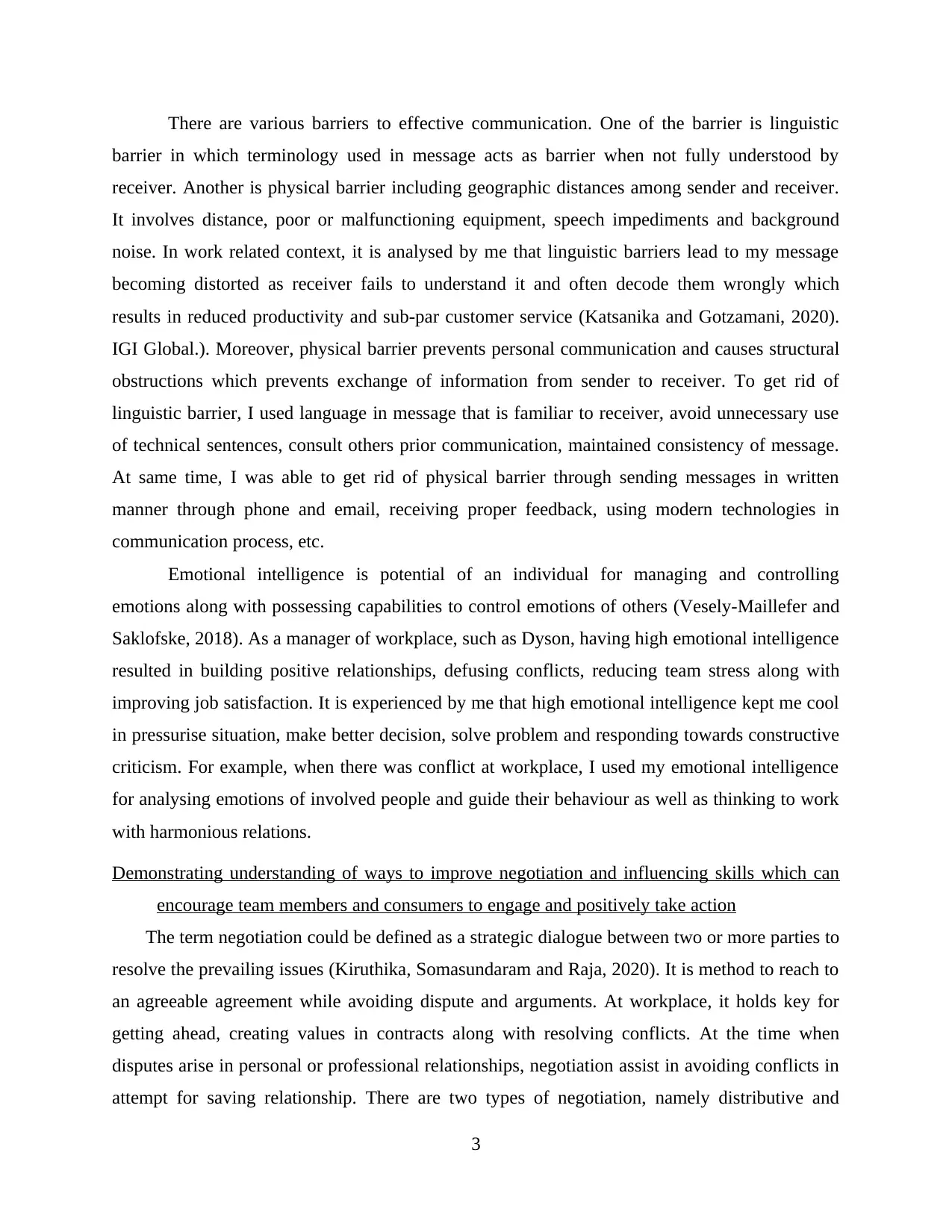
There are various barriers to effective communication. One of the barrier is linguistic
barrier in which terminology used in message acts as barrier when not fully understood by
receiver. Another is physical barrier including geographic distances among sender and receiver.
It involves distance, poor or malfunctioning equipment, speech impediments and background
noise. In work related context, it is analysed by me that linguistic barriers lead to my message
becoming distorted as receiver fails to understand it and often decode them wrongly which
results in reduced productivity and sub-par customer service (Katsanika and Gotzamani, 2020).
IGI Global.). Moreover, physical barrier prevents personal communication and causes structural
obstructions which prevents exchange of information from sender to receiver. To get rid of
linguistic barrier, I used language in message that is familiar to receiver, avoid unnecessary use
of technical sentences, consult others prior communication, maintained consistency of message.
At same time, I was able to get rid of physical barrier through sending messages in written
manner through phone and email, receiving proper feedback, using modern technologies in
communication process, etc.
Emotional intelligence is potential of an individual for managing and controlling
emotions along with possessing capabilities to control emotions of others (Vesely-Maillefer and
Saklofske, 2018). As a manager of workplace, such as Dyson, having high emotional intelligence
resulted in building positive relationships, defusing conflicts, reducing team stress along with
improving job satisfaction. It is experienced by me that high emotional intelligence kept me cool
in pressurise situation, make better decision, solve problem and responding towards constructive
criticism. For example, when there was conflict at workplace, I used my emotional intelligence
for analysing emotions of involved people and guide their behaviour as well as thinking to work
with harmonious relations.
Demonstrating understanding of ways to improve negotiation and influencing skills which can
encourage team members and consumers to engage and positively take action
The term negotiation could be defined as a strategic dialogue between two or more parties to
resolve the prevailing issues (Kiruthika, Somasundaram and Raja, 2020). It is method to reach to
an agreeable agreement while avoiding dispute and arguments. At workplace, it holds key for
getting ahead, creating values in contracts along with resolving conflicts. At the time when
disputes arise in personal or professional relationships, negotiation assist in avoiding conflicts in
attempt for saving relationship. There are two types of negotiation, namely distributive and
3
barrier in which terminology used in message acts as barrier when not fully understood by
receiver. Another is physical barrier including geographic distances among sender and receiver.
It involves distance, poor or malfunctioning equipment, speech impediments and background
noise. In work related context, it is analysed by me that linguistic barriers lead to my message
becoming distorted as receiver fails to understand it and often decode them wrongly which
results in reduced productivity and sub-par customer service (Katsanika and Gotzamani, 2020).
IGI Global.). Moreover, physical barrier prevents personal communication and causes structural
obstructions which prevents exchange of information from sender to receiver. To get rid of
linguistic barrier, I used language in message that is familiar to receiver, avoid unnecessary use
of technical sentences, consult others prior communication, maintained consistency of message.
At same time, I was able to get rid of physical barrier through sending messages in written
manner through phone and email, receiving proper feedback, using modern technologies in
communication process, etc.
Emotional intelligence is potential of an individual for managing and controlling
emotions along with possessing capabilities to control emotions of others (Vesely-Maillefer and
Saklofske, 2018). As a manager of workplace, such as Dyson, having high emotional intelligence
resulted in building positive relationships, defusing conflicts, reducing team stress along with
improving job satisfaction. It is experienced by me that high emotional intelligence kept me cool
in pressurise situation, make better decision, solve problem and responding towards constructive
criticism. For example, when there was conflict at workplace, I used my emotional intelligence
for analysing emotions of involved people and guide their behaviour as well as thinking to work
with harmonious relations.
Demonstrating understanding of ways to improve negotiation and influencing skills which can
encourage team members and consumers to engage and positively take action
The term negotiation could be defined as a strategic dialogue between two or more parties to
resolve the prevailing issues (Kiruthika, Somasundaram and Raja, 2020). It is method to reach to
an agreeable agreement while avoiding dispute and arguments. At workplace, it holds key for
getting ahead, creating values in contracts along with resolving conflicts. At the time when
disputes arise in personal or professional relationships, negotiation assist in avoiding conflicts in
attempt for saving relationship. There are two types of negotiation, namely distributive and
3
⊘ This is a preview!⊘
Do you want full access?
Subscribe today to unlock all pages.

Trusted by 1+ million students worldwide
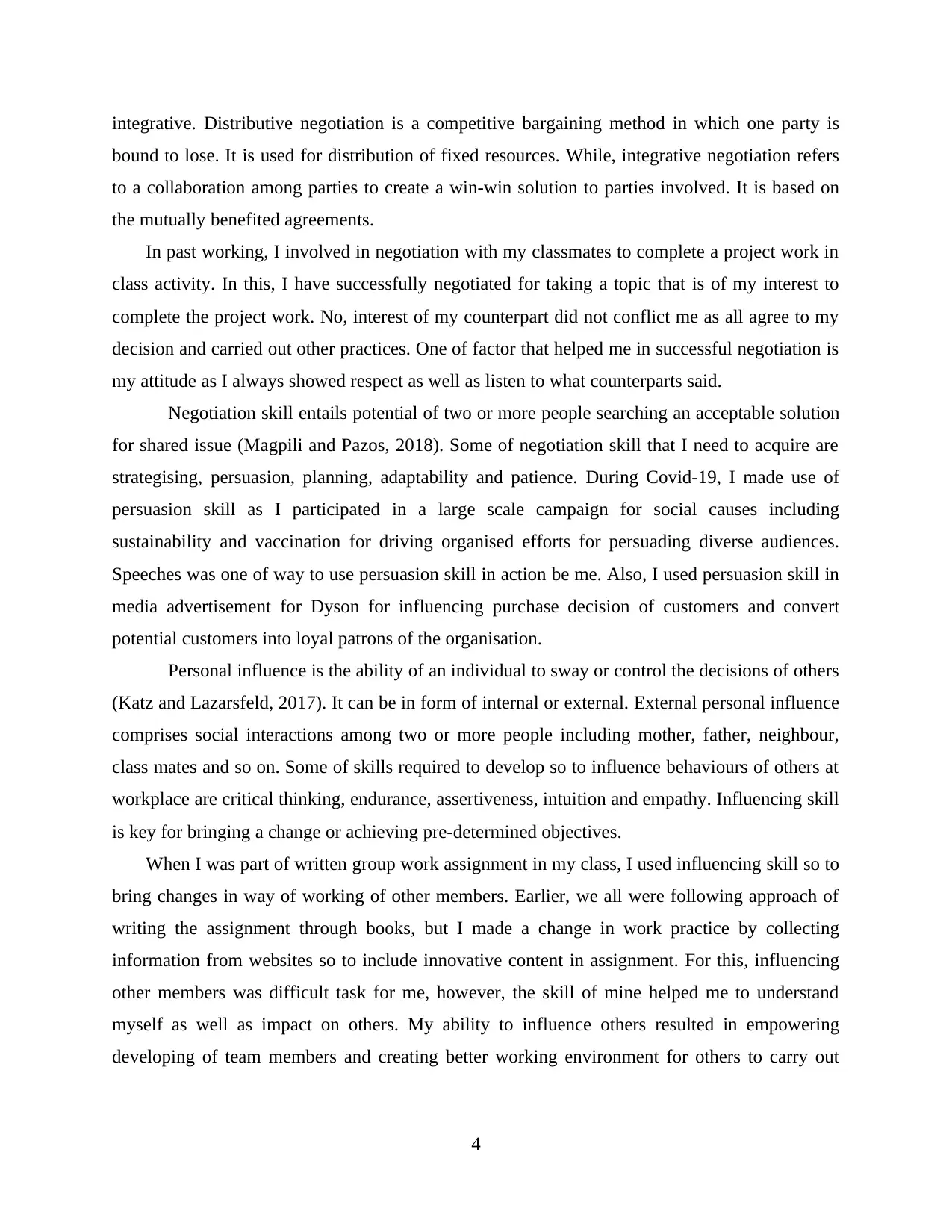
integrative. Distributive negotiation is a competitive bargaining method in which one party is
bound to lose. It is used for distribution of fixed resources. While, integrative negotiation refers
to a collaboration among parties to create a win-win solution to parties involved. It is based on
the mutually benefited agreements.
In past working, I involved in negotiation with my classmates to complete a project work in
class activity. In this, I have successfully negotiated for taking a topic that is of my interest to
complete the project work. No, interest of my counterpart did not conflict me as all agree to my
decision and carried out other practices. One of factor that helped me in successful negotiation is
my attitude as I always showed respect as well as listen to what counterparts said.
Negotiation skill entails potential of two or more people searching an acceptable solution
for shared issue (Magpili and Pazos, 2018). Some of negotiation skill that I need to acquire are
strategising, persuasion, planning, adaptability and patience. During Covid-19, I made use of
persuasion skill as I participated in a large scale campaign for social causes including
sustainability and vaccination for driving organised efforts for persuading diverse audiences.
Speeches was one of way to use persuasion skill in action be me. Also, I used persuasion skill in
media advertisement for Dyson for influencing purchase decision of customers and convert
potential customers into loyal patrons of the organisation.
Personal influence is the ability of an individual to sway or control the decisions of others
(Katz and Lazarsfeld, 2017). It can be in form of internal or external. External personal influence
comprises social interactions among two or more people including mother, father, neighbour,
class mates and so on. Some of skills required to develop so to influence behaviours of others at
workplace are critical thinking, endurance, assertiveness, intuition and empathy. Influencing skill
is key for bringing a change or achieving pre-determined objectives.
When I was part of written group work assignment in my class, I used influencing skill so to
bring changes in way of working of other members. Earlier, we all were following approach of
writing the assignment through books, but I made a change in work practice by collecting
information from websites so to include innovative content in assignment. For this, influencing
other members was difficult task for me, however, the skill of mine helped me to understand
myself as well as impact on others. My ability to influence others resulted in empowering
developing of team members and creating better working environment for others to carry out
4
bound to lose. It is used for distribution of fixed resources. While, integrative negotiation refers
to a collaboration among parties to create a win-win solution to parties involved. It is based on
the mutually benefited agreements.
In past working, I involved in negotiation with my classmates to complete a project work in
class activity. In this, I have successfully negotiated for taking a topic that is of my interest to
complete the project work. No, interest of my counterpart did not conflict me as all agree to my
decision and carried out other practices. One of factor that helped me in successful negotiation is
my attitude as I always showed respect as well as listen to what counterparts said.
Negotiation skill entails potential of two or more people searching an acceptable solution
for shared issue (Magpili and Pazos, 2018). Some of negotiation skill that I need to acquire are
strategising, persuasion, planning, adaptability and patience. During Covid-19, I made use of
persuasion skill as I participated in a large scale campaign for social causes including
sustainability and vaccination for driving organised efforts for persuading diverse audiences.
Speeches was one of way to use persuasion skill in action be me. Also, I used persuasion skill in
media advertisement for Dyson for influencing purchase decision of customers and convert
potential customers into loyal patrons of the organisation.
Personal influence is the ability of an individual to sway or control the decisions of others
(Katz and Lazarsfeld, 2017). It can be in form of internal or external. External personal influence
comprises social interactions among two or more people including mother, father, neighbour,
class mates and so on. Some of skills required to develop so to influence behaviours of others at
workplace are critical thinking, endurance, assertiveness, intuition and empathy. Influencing skill
is key for bringing a change or achieving pre-determined objectives.
When I was part of written group work assignment in my class, I used influencing skill so to
bring changes in way of working of other members. Earlier, we all were following approach of
writing the assignment through books, but I made a change in work practice by collecting
information from websites so to include innovative content in assignment. For this, influencing
other members was difficult task for me, however, the skill of mine helped me to understand
myself as well as impact on others. My ability to influence others resulted in empowering
developing of team members and creating better working environment for others to carry out
4
Paraphrase This Document
Need a fresh take? Get an instant paraphrase of this document with our AI Paraphraser
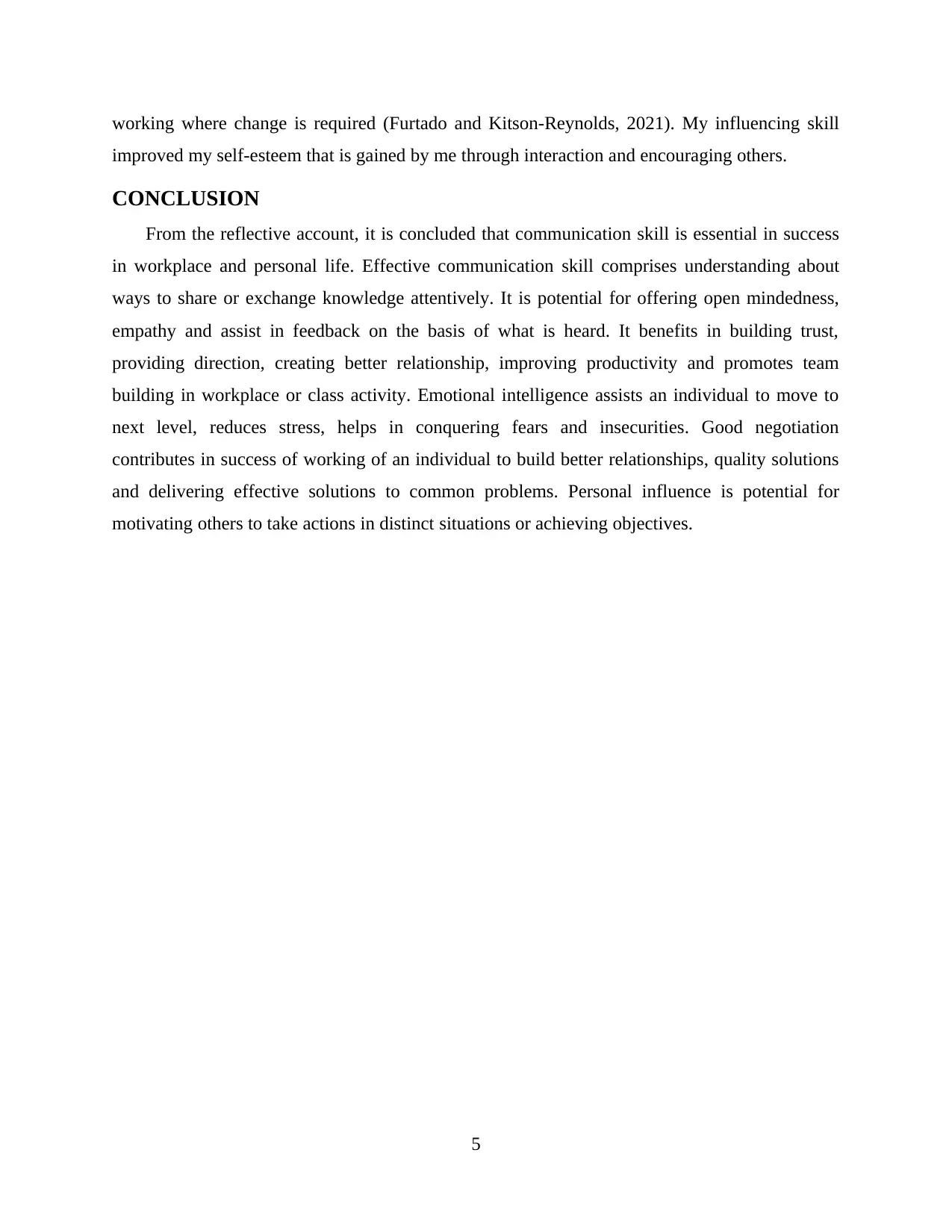
working where change is required (Furtado and Kitson-Reynolds, 2021). My influencing skill
improved my self-esteem that is gained by me through interaction and encouraging others.
CONCLUSION
From the reflective account, it is concluded that communication skill is essential in success
in workplace and personal life. Effective communication skill comprises understanding about
ways to share or exchange knowledge attentively. It is potential for offering open mindedness,
empathy and assist in feedback on the basis of what is heard. It benefits in building trust,
providing direction, creating better relationship, improving productivity and promotes team
building in workplace or class activity. Emotional intelligence assists an individual to move to
next level, reduces stress, helps in conquering fears and insecurities. Good negotiation
contributes in success of working of an individual to build better relationships, quality solutions
and delivering effective solutions to common problems. Personal influence is potential for
motivating others to take actions in distinct situations or achieving objectives.
5
improved my self-esteem that is gained by me through interaction and encouraging others.
CONCLUSION
From the reflective account, it is concluded that communication skill is essential in success
in workplace and personal life. Effective communication skill comprises understanding about
ways to share or exchange knowledge attentively. It is potential for offering open mindedness,
empathy and assist in feedback on the basis of what is heard. It benefits in building trust,
providing direction, creating better relationship, improving productivity and promotes team
building in workplace or class activity. Emotional intelligence assists an individual to move to
next level, reduces stress, helps in conquering fears and insecurities. Good negotiation
contributes in success of working of an individual to build better relationships, quality solutions
and delivering effective solutions to common problems. Personal influence is potential for
motivating others to take actions in distinct situations or achieving objectives.
5
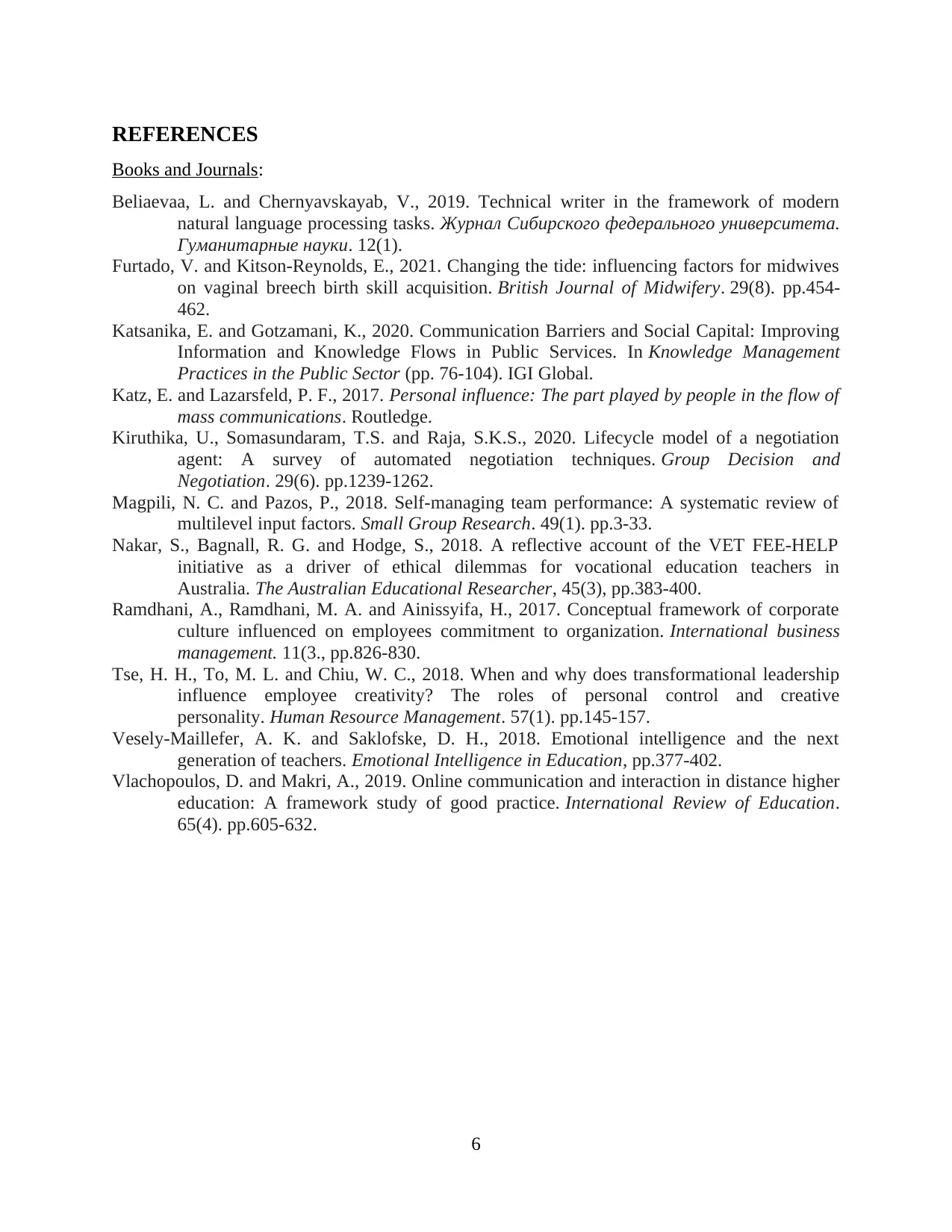
REFERENCES
Books and Journals:
Beliaevaa, L. and Chernyavskayab, V., 2019. Technical writer in the framework of modern
natural language processing tasks. Журнал Сибирского федерального университета.
Гуманитарные науки. 12(1).
Furtado, V. and Kitson-Reynolds, E., 2021. Changing the tide: influencing factors for midwives
on vaginal breech birth skill acquisition. British Journal of Midwifery. 29(8). pp.454-
462.
Katsanika, E. and Gotzamani, K., 2020. Communication Barriers and Social Capital: Improving
Information and Knowledge Flows in Public Services. In Knowledge Management
Practices in the Public Sector (pp. 76-104). IGI Global.
Katz, E. and Lazarsfeld, P. F., 2017. Personal influence: The part played by people in the flow of
mass communications. Routledge.
Kiruthika, U., Somasundaram, T.S. and Raja, S.K.S., 2020. Lifecycle model of a negotiation
agent: A survey of automated negotiation techniques. Group Decision and
Negotiation. 29(6). pp.1239-1262.
Magpili, N. C. and Pazos, P., 2018. Self-managing team performance: A systematic review of
multilevel input factors. Small Group Research. 49(1). pp.3-33.
Nakar, S., Bagnall, R. G. and Hodge, S., 2018. A reflective account of the VET FEE-HELP
initiative as a driver of ethical dilemmas for vocational education teachers in
Australia. The Australian Educational Researcher, 45(3), pp.383-400.
Ramdhani, A., Ramdhani, M. A. and Ainissyifa, H., 2017. Conceptual framework of corporate
culture influenced on employees commitment to organization. International business
management. 11(3., pp.826-830.
Tse, H. H., To, M. L. and Chiu, W. C., 2018. When and why does transformational leadership
influence employee creativity? The roles of personal control and creative
personality. Human Resource Management. 57(1). pp.145-157.
Vesely-Maillefer, A. K. and Saklofske, D. H., 2018. Emotional intelligence and the next
generation of teachers. Emotional Intelligence in Education, pp.377-402.
Vlachopoulos, D. and Makri, A., 2019. Online communication and interaction in distance higher
education: A framework study of good practice. International Review of Education.
65(4). pp.605-632.
6
Books and Journals:
Beliaevaa, L. and Chernyavskayab, V., 2019. Technical writer in the framework of modern
natural language processing tasks. Журнал Сибирского федерального университета.
Гуманитарные науки. 12(1).
Furtado, V. and Kitson-Reynolds, E., 2021. Changing the tide: influencing factors for midwives
on vaginal breech birth skill acquisition. British Journal of Midwifery. 29(8). pp.454-
462.
Katsanika, E. and Gotzamani, K., 2020. Communication Barriers and Social Capital: Improving
Information and Knowledge Flows in Public Services. In Knowledge Management
Practices in the Public Sector (pp. 76-104). IGI Global.
Katz, E. and Lazarsfeld, P. F., 2017. Personal influence: The part played by people in the flow of
mass communications. Routledge.
Kiruthika, U., Somasundaram, T.S. and Raja, S.K.S., 2020. Lifecycle model of a negotiation
agent: A survey of automated negotiation techniques. Group Decision and
Negotiation. 29(6). pp.1239-1262.
Magpili, N. C. and Pazos, P., 2018. Self-managing team performance: A systematic review of
multilevel input factors. Small Group Research. 49(1). pp.3-33.
Nakar, S., Bagnall, R. G. and Hodge, S., 2018. A reflective account of the VET FEE-HELP
initiative as a driver of ethical dilemmas for vocational education teachers in
Australia. The Australian Educational Researcher, 45(3), pp.383-400.
Ramdhani, A., Ramdhani, M. A. and Ainissyifa, H., 2017. Conceptual framework of corporate
culture influenced on employees commitment to organization. International business
management. 11(3., pp.826-830.
Tse, H. H., To, M. L. and Chiu, W. C., 2018. When and why does transformational leadership
influence employee creativity? The roles of personal control and creative
personality. Human Resource Management. 57(1). pp.145-157.
Vesely-Maillefer, A. K. and Saklofske, D. H., 2018. Emotional intelligence and the next
generation of teachers. Emotional Intelligence in Education, pp.377-402.
Vlachopoulos, D. and Makri, A., 2019. Online communication and interaction in distance higher
education: A framework study of good practice. International Review of Education.
65(4). pp.605-632.
6
⊘ This is a preview!⊘
Do you want full access?
Subscribe today to unlock all pages.

Trusted by 1+ million students worldwide
1 out of 9
Related Documents
Your All-in-One AI-Powered Toolkit for Academic Success.
+13062052269
info@desklib.com
Available 24*7 on WhatsApp / Email
![[object Object]](/_next/static/media/star-bottom.7253800d.svg)
Unlock your academic potential
Copyright © 2020–2025 A2Z Services. All Rights Reserved. Developed and managed by ZUCOL.





